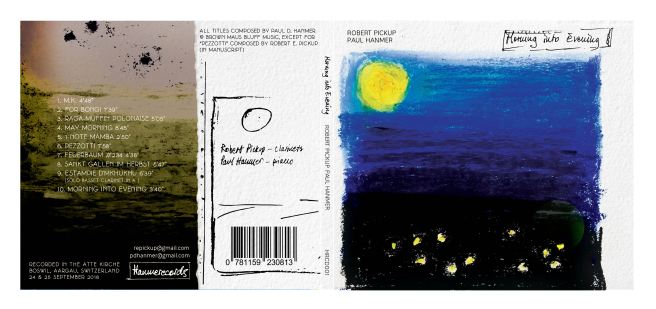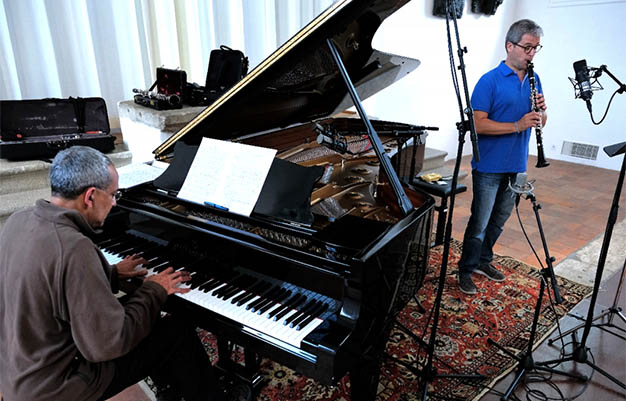Hard to credit, but it’s been 14 years since pianist Paul Hanmer last released an album of his own compositions: Accused No 1: Nelson Mandela, in 2006.
It doesn’t feel so long, because he remains very much present in music. We saw him accompanying silent movies at the Bioscope only last month. And he hasn’t been idle during that time: playing improvised and composed music on stages from the Birds Eye Jazz Club in Switzerland to Jazz in the Native Yards in Cape Town; festivals from Joy of Jazz to International Mozart; compositions for everything from full orchestra to chamber ensemble and, two years ago, a full requiem Mass for the First Peoples. But still, 14 years and no album…
Now, he’s more than making up for that long gap. Hanmer is launching not one but two new albums: Morning into Evening, a set of duos with clarinettist Robert Pickup ( South African-born principal clarinettist with the Philharmonia Zurich Orchestra), and Concordia, a set of ten new solo piano pieces, both on his newest venture, the Hanmerecords label (pdhanmer@gmail.com). In total, we get nearly two hours of Hanmer’s distinctive composer’s voice and keyboard touch.
New old music
“Some of the material,” he says, “goes back ten years. Three tunes were composed for a session at Peter Pearlson’s engineering academy at SABC RadioPark. At the time I wasn’t entirely satisfied with what we’d recorded…but when I listen to it now, I feel very different…my attitude to what something being ‘perfect’ means has changed a lot in the past few years…” But more of that later…
Both albums were recorded in Switzerland, at the Alte Kirche, Boswil, in September 2018. Hanmer already had a recording session set up there. He’d been offered two days “to record whatever I wanted” and originally hoped to revisit the compositions on his 2002 Windows to Elsewhere. But some of his hoped-for personnel – “almost fortuitously”, he reflects now – couldn’t make the dates. Pickup is now Hanmer’s second-longest reed collaborator after McCoy Mrubata (who isn’t forgotten on the solo album, with a reworking of his composition Nthuthu’s Theme) and the two knew they could still use the time creatively.

So he and Pickup recorded a day and a half of duo work, and, on the half-day when the clarinettist wasn’t available – the solo piano session. That had particular personal resonance for Hanmer: “For years, my dad always urged me to record a solo album. And I never did while he was alive. This one’s for him.”
Pickup co-produced the duo album and contributed the composition Pezzotti to it: a tribute to the late Swiss cellist Daniel Pezzotti. But Hanmer also asked him to produce the solo session, something the clarinettist was initially reluctant to take on.
Working together
It was mildly unnerving, Hanmer concedes, to put his solo tracks in Pickup’s hands. “I’m so glad I asked him. I couldn’t then withdraw my faith in him – even though there were some decisions I found a bit startling at first, in terms of both the compositions he left untouched – Concordia, 16 June, All About Adelaide, Salivation Army – and the ones he edited down, like Blue Marlin and Bounce. But I realise that when I listen to my own playing, I bring awareness of my own intent to that listening. Robert dealt with what came out; I made completely the right decision to trust him.”

Morning into Evening is an album that resists genre labels. It’s certainly not improvised jazz: the music was almost entirely scored, “though some, like the title track, we mapped there and then because Robert hadn’t seen them before.” That tune had originally been conceived for McCoy Mrubata and a string ensemble. “When Robert saw it, he knew in a very precise and un-pedantic way that it would be right for us.”
But good musicians never just play the notes: they bring to their interpretation a myriad of micro- (and mostly imperceptible) decisions about dynamics, phrasing and the interactions with playing partners. Hanmer’s melodies still often feel jazzy, with narrative lines that swing, and inflections invoking the blues chords: May Morning and 1-note Mamba in particular will probably get called “jazz” when ClassicFM plays them.
The fact is, the labels don’t – and shouldn’t – matter. What the two musicians have produced is a collection of gorgeously memorable melodies (Sankt Gallen im Herbst comes dangerously close to earworm territory), and an object lesson in the beauty of working together. Each player gracefully cedes space or offers strength as it’s needed; though the compositions are Hanmer’s, they share the sonic territory as equal partners. “Robert’s playing is technically superb,” says Hanmer, “but almost ‘casual’ – so easy to work with that I don’t have to think what I play against it, because it’s always going to be reliable, beautiful, solid and supportive.”

Hanmer is particularly fond of the solo tune he composed for Pickup, Estampie D’Mkhukhu, played on the basset clarinet. “That’s a modern replica of an instrument that wasn’t even called a clarinet when it was played in Mozart’s time. It has a beautiful sound and a big range that it was great to compose for. Robert uses it as an encore piece when he’s played a concerto from that era – the fade at the end allows him to walk off stage still playing.”
Windows to everywhere
On Morning into Evening, Hanmer’s writing applies a South African sensibility to musical inspirations from everywhere. On Concordia, he brings those inspirations from everywhere to bear on some tunes firmly rooted in home.
The solo album opens with the wryly-titled Same Old: those I:IV:V mbaqanga chords. But it’s by no means the same old, and nor are the other tracks where that feel returns full-force: 16 June, Bounce and the very Capetonian Blue Marlin. Salivation Army offers moving, churchy chords. The title track, meanwhile, sounds like it might have escaped from Trains to Taung and travelled to some really interesting places before coming home. “I wanted to deliver,” Hanmer says,” a sound that was unmistakably of this place. Not just from home, but from my home. I had a feeling if I played those songs without too much posturing – clean technique, clean mood – that would come out: it would sound like the music I play with McCoy and my other collaborators here. I think it does – and yet I’m recording in the middle of Switzerland!”

The technique might be, in Hanmer’s words, “clean” but it is also often astounding. The closer, Bossy Bossa isn’t at all what the title and the easy jazzing lilt of its opening phrases might lead you to expect. Those elements seduce you towards an impro that – if this was a live set – would have you whooping and stamping in awe.
All this, and the man is now running a record label too? That, says Hanmer, slightly overstates the case. “I’m still learning admin and arguing with myself about the technicalities of mailing an album.” Nevertheless, after too many years dealing with the mainstream music industry, he’s had enough. “ Some people I worked with clearly wanted to do the right thing, but I’ve had too many bad experiences. Decisions that made no musical sense and were clearly just about money. Problems with the quality of pressings that nobody seemed to care about. This feels like a small first step away from those kinds of systems.”
A couple of years back, Hanmer came through a serious illness. That – and simply growing older – he says, has helped him make those kinds of decisions, and revisit concepts of musical ‘perfection’ from a more mature perspective. “Whenever, wherever you’re playing, you won’t repeat that exact moment again. Let it breathe; give it love. You might never get that chance again, motherfucker – that’s what makes it perfect!”
- Order the albums from Hanmerecords email above. Hear Paul and Robert together at the Spier concert season in late November – and more dates might be added to that visit.